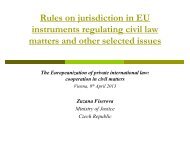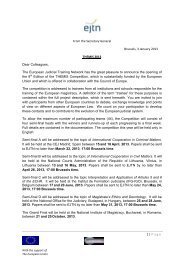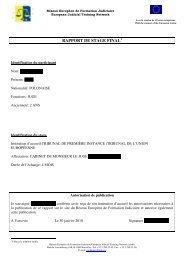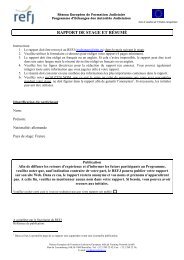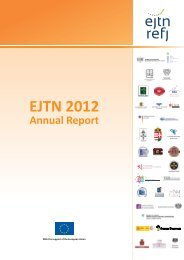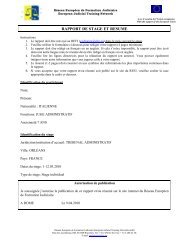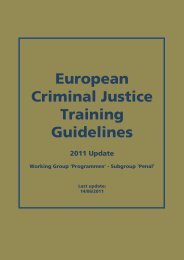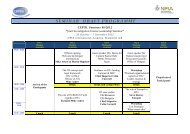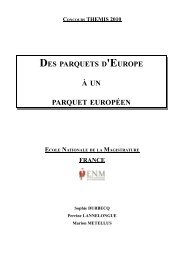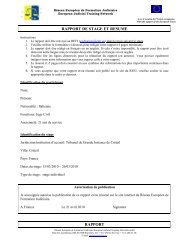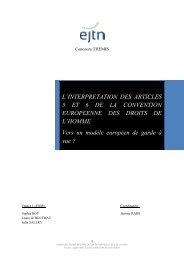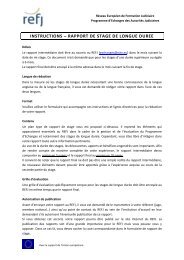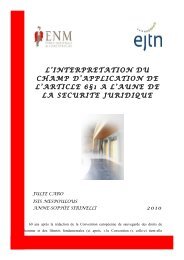Mr Carlos M.G. De Melo Marinho - EJTN
Mr Carlos M.G. De Melo Marinho - EJTN
Mr Carlos M.G. De Melo Marinho - EJTN
- No tags were found...
You also want an ePaper? Increase the reach of your titles
YUMPU automatically turns print PDFs into web optimized ePapers that Google loves.
The future development<br />
of European legal<br />
instruments<br />
<strong>Carlos</strong> M. G. de <strong>Melo</strong> <strong>Marinho</strong><br />
Judge of Court of Appeal<br />
Vienna – March 2013
Present situation<br />
●<br />
●<br />
●<br />
Private international law in EU has stopped being a matter of national law<br />
and of some sporadic international conventions – namely of the Hague<br />
Conference on Private International Law – and started to have a horizontal<br />
and common dimension;<br />
It was expressly recognized that private international law measures are<br />
required to support the free movement of citizens;<br />
Consistent efforts were made at the EU level, in order to reach the<br />
establishment of an area of freedom, security, and justice through the<br />
adoption of measures in the field of judicial cooperation in civil matters,<br />
thus aiming to make reality the command coming from Article 61 EC Treaty<br />
and, after, from Article 67 TFEU;<br />
<strong>Carlos</strong> M. G. de <strong>Melo</strong> <strong>Marinho</strong> - Judge of Court of Appeal 2
Present situation<br />
●<br />
A broad framework of private international law has been established –<br />
several regulations, directives – especially on legal aid (2002/8/EC),<br />
compensation of crime victims (2004/80/EC) and mediation (2008/52/EC) –<br />
and decisions on judicial cooperation in civil and commercial matters were<br />
approved and are in force, accompanied by programs – Hague Program<br />
(2004) and the Stockholm Program (2009) –, conclusions, guides and<br />
declarations, produced during 14 years;<br />
●<br />
It was developed and materialized the revolutionary idea of the free<br />
circulation of judicial (or similar) decisions – general suppression of the<br />
intermediate measures for enforcement (exequatur) – principle of mutual<br />
recognition of judicial and extra-judicial decisions in civil matters – Article 61<br />
TEC, Article 29 TEU and Article 67 of TFEU; it was several times times used<br />
after Brussels II bis Regulation and was aimed to extend it to the most<br />
important tool of this area, the Brussels I Regulation;<br />
<strong>Carlos</strong> M. G. de <strong>Melo</strong> <strong>Marinho</strong> - Judge of Court of Appeal 3
Present situation<br />
●<br />
●<br />
●<br />
It was recognized the principle of the direct cooperation between the EU<br />
courts;<br />
It was established a European Judicial Network in civil and commercial<br />
matters which produced some fruits and helped to install the new logic of<br />
the judicial cooperation in the EU – Council <strong>De</strong>cision 2001/470/EC, in OJ L<br />
174, 27.6.2001, p. 25 and <strong>De</strong>cision No 568/2009/EC in OJ L 168, 30.6.2009, p.<br />
35;<br />
The intervention of the central authorities was reshaped, becoming<br />
qualified and better articulated but residual;<br />
<strong>Carlos</strong> M. G. de <strong>Melo</strong> <strong>Marinho</strong> - Judge of Court of Appeal 4
Present situation<br />
●<br />
The regulation became the instrument of choice for the EU law production in the<br />
civil and commercial area, for efficacy reasons. The following represent the result<br />
of such choice:<br />
✔<br />
Brussels I Regulation, No. 44/2001, on jurisdiction, recognition and<br />
enforcement, (from 2015, the Regulation No 1215/2012 of 12 <strong>De</strong>cember<br />
2012);<br />
✔<br />
European Enforcement Order Regulation, No. 805/2004;<br />
✔<br />
European Order for Payment Procedure Regulation, No. 1896/2006;<br />
✔<br />
European Small Claims Procedure Regulation, No. 861/2006;<br />
✔<br />
Insolvency Regulation, No. 1346/2000;<br />
✔<br />
Taking of evidence Regulation, No. 1206/2001;<br />
<strong>Carlos</strong> M. G. de <strong>Melo</strong> <strong>Marinho</strong> - Judge of Court of Appeal 5
Present situation<br />
✔<br />
Service of documents Regulation No. 1393/2007;<br />
✔<br />
✔<br />
✔<br />
Rome I Regulation, No. 593/2008 on contractual obligations;<br />
Rome II Regulation, No. 864/2007, on non-contractual obligations;<br />
Brussels II bis Regulation, No. 2201/2003 on jurisdiction, recognition<br />
and enforcement divorce and parental responsibility;<br />
✔<br />
Maintenance Regulation, No. 4/2009;<br />
✔<br />
Rome III Regulation, No. 1259/2010 (divorce and legal separation) and<br />
Succession Regulation, No. 650/2012.<br />
<strong>Carlos</strong> M. G. de <strong>Melo</strong> <strong>Marinho</strong> - Judge of Court of Appeal 6
Pending law creation<br />
●<br />
Matrimonial property regimes – COM(2011) 126 of 16 March 2011;<br />
●<br />
Property consequences of registered partnerships – COM(2011) 127 of 16<br />
March 2011;<br />
●<br />
Mutual recognition of protection measures in civil matters – COM(2011) 276<br />
of 18.5.2011.<br />
<strong>Carlos</strong> M. G. de <strong>Melo</strong> <strong>Marinho</strong> - Judge of Court of Appeal 7
Program emerging from the TFEU<br />
●<br />
<strong>De</strong>velopment of the three central themes of private international law –<br />
international jurisdiction, the applicable law and the recognition and<br />
enforcement of foreign judgments – Article 81(2)(a) and (c) of the Treaty<br />
on the Functioning of the European Union (TFEU);<br />
✗<br />
✗<br />
Difficulty: the adoption of family law measures requires<br />
unanimity – Article 81(3);<br />
Possible solution in family matters: the procedure of<br />
enhanced cooperation; see the Rome III Regulation on the law<br />
applicable to divorce (Council Regulation (EU) No. 1259/2010<br />
of 20 <strong>De</strong>cember 2010), in which fifteen Member States<br />
presently participate and, in a different area, the unitary<br />
patent protection Regulations, No. 1257/2012 and No<br />
1260/2012;<br />
<strong>Carlos</strong> M. G. de <strong>Melo</strong> <strong>Marinho</strong> - Judge of Court of Appeal 8
Program emerging from the TFEU<br />
✗<br />
Risks:<br />
(a) creation of two speeds in the building of the<br />
European Space of Justice;<br />
(b) tendency to prioritize non-family subjects.<br />
●<br />
<strong>De</strong>velopment of the existing rules on procedural and statutory aspects<br />
of the judicial cooperation – service of judicial and extra-judicial<br />
documents, taking of evidence, and access to justice – Article 81(2)(b), (d)<br />
and (e);<br />
<strong>Carlos</strong> M. G. de <strong>Melo</strong> <strong>Marinho</strong> - Judge of Court of Appeal 9
Program emerging from the TFEU<br />
●<br />
Promotion of the compatibility of the rules on civil procedure applicable<br />
in the Member States, where necessary to assure the proper functioning of<br />
civil proceedings – which still leaves us far from a EU Civil Procedure Code –<br />
Article 81(2)(f);<br />
●<br />
<strong>De</strong>velopment of alternative methods of dispute settlement – Article 81(2)<br />
(g);<br />
●<br />
Support for the training not only of the judiciary but also of the judicial<br />
staff – Article 81(2)(h).<br />
<strong>Carlos</strong> M. G. de <strong>Melo</strong> <strong>Marinho</strong> - Judge of Court of Appeal 10
Next great objectives<br />
●<br />
●<br />
To produce isolated legal instruments that can cover the specific private<br />
international law areas that, in spite of the enormous post-Amsterdam<br />
Treaty developments, are still governed by national rules or that will be<br />
considered decisive to grant the cooperation between the European<br />
Courts;<br />
Assure, in such process, the coherence and common interpretation of the<br />
legal tools – risks of loosing congruity: see the Regulation Regulation (EU)<br />
No. 650/2012 in matters of succession that abandons the promising route<br />
of the absolute suppression of recognition procedures and exequatur seen<br />
in other European Regulations in Civil and Commercial Matters posterior to<br />
Brussels II bis Regulation and just sets up full mutual recognition of<br />
decisions, authentic instruments and court settlements;<br />
<strong>Carlos</strong> M. G. de <strong>Melo</strong> <strong>Marinho</strong> - Judge of Court of Appeal 11
Next great objectives<br />
●<br />
Generate the conditions for the creation, on a medium/long term basis, of<br />
a comprehensive legal structure or a EU Private International Law code<br />
(simple merging of the existing instruments into one single instrument,<br />
new code, corrective code, codification with recast; eventually starting by<br />
the merging of Regulations Rome I and II)<br />
Advantages:<br />
✗<br />
✗<br />
✗<br />
✗<br />
Reduction of the volume of the legislation;<br />
Accessibility;<br />
Clarity on the content of the private international law rules;<br />
Better approach to the citizens and companies with the consequent<br />
diminution of the obstacles to their entrance into cross-border<br />
economical and juridical relationships;<br />
<strong>Carlos</strong> M. G. de <strong>Melo</strong> <strong>Marinho</strong> - Judge of Court of Appeal 12
Next great objectives<br />
✗<br />
✗<br />
✗<br />
✗<br />
✗<br />
Systematization;<br />
Correction of redundancies;<br />
Attainment of a coherent structure of private international law rules;<br />
Simplification of the training of the legal professionals;<br />
Reduction of the costs in cross-border litigation – not only for the parties<br />
but also at the level of the system functioning expenses.<br />
Difficulties:<br />
✗<br />
✗<br />
Scarce political support;<br />
Non coincident perspectives on central notions of private international<br />
law;<br />
<strong>Carlos</strong> M. G. de <strong>Melo</strong> <strong>Marinho</strong> - Judge of Court of Appeal 13
Next great objectives<br />
✗<br />
✗<br />
✗<br />
✗<br />
✗<br />
✗<br />
Strong differences on the conceptions of society and sexual life with<br />
expression on substantive law, namely in the family domain, same-sex<br />
marriages, registered partnerships and names;<br />
Distinct scope and subject matters;<br />
More complex legislative process;<br />
Harder process of gradual approval of instruments having incidence on<br />
specific topics, particularly if it is chosen a time concentrated or<br />
simultaneous adoption of such code;<br />
Attainment of substantial agreements on central principles – general<br />
concepts of private international law (e.g. the role of overriding<br />
mandatory law and the application of foreign law);<br />
Present tendency for the enhanced cooperation and the special<br />
positions of United Kingdom, Ireland and <strong>De</strong>nmark.<br />
<strong>Carlos</strong> M. G. de <strong>Melo</strong> <strong>Marinho</strong> - Judge of Court of Appeal 14
Next great objectives<br />
●<br />
●<br />
To make information and direct access to justice tools available to citizens<br />
and business through digital means;<br />
Widely perform the training of the European legal professionals in order to<br />
prepare them for the European judicial cooperation in civil matters and to<br />
act in the new common space of justice.<br />
<strong>Carlos</strong> M. G. de <strong>Melo</strong> <strong>Marinho</strong> - Judge of Court of Appeal 15
Challenges<br />
●<br />
To call the citizens to the new dynamics of the judicial cooperation in civil<br />
and commercial matters;<br />
●<br />
●<br />
●<br />
●<br />
To avoid the recurrence of rules coming from the co-existence of legal<br />
instruments in converging areas;<br />
To fight complexity that comes from increasing the volume of the EU law<br />
eventually through codification;<br />
To harmonize the EU law;<br />
To produce accessibility to such law in spite of the referred increase of<br />
volume;<br />
●<br />
To fight the incompatibility of legal systems and to create common<br />
approaches;<br />
<strong>Carlos</strong> M. G. de <strong>Melo</strong> <strong>Marinho</strong> - Judge of Court of Appeal 16
Challenges<br />
●<br />
●<br />
●<br />
To provide certainty on the definition of the applicable law;<br />
To mitigate the effects on the common area of justice produced by the<br />
special position held by the UK, Ireland (decision to opt in is needed), and<br />
<strong>De</strong>nmark (excluded from this dynamics) that generates territorial<br />
disintegration – two-speed Europe –, fragmentation of the EU framework<br />
and loss of coherence and previsibility of the rulings, moves away and<br />
frightens the citizens and decreases their level of comprehension of the EU<br />
law system, generating phenomenons of ‘forum shopping’ within the EU;<br />
To give worldwide territorial scope to some instruments – eg. expanding<br />
effects to non-EU torts, parties, and legal rules;<br />
<strong>Carlos</strong> M. G. de <strong>Melo</strong> <strong>Marinho</strong> - Judge of Court of Appeal 17
Challenges<br />
●<br />
The establishment of minimum procedural standards can lead to the<br />
creation of procedural rules also applicable to non cross-border relations<br />
and of an European procedure code – as it was envisaged in the first<br />
preparatory works of the triptych small claims, European Enforcement<br />
Order and Order for payment procedure and admitted by the proposals of<br />
the Storme working group, presented to the Commission in 1993: Marcel<br />
Storme (ed.), Rapprochement du Droit Judiciaire de L’Union<br />
européenne/Approximation of Judiciary Law in the European Union, Martinus<br />
Nijhoff Publishers 1994<br />
<strong>Carlos</strong> M. G. de <strong>Melo</strong> <strong>Marinho</strong> - Judge of Court of Appeal 18
Areas that need to be covered<br />
●<br />
Trusts – even being, essentially, a common law figure;<br />
●<br />
●<br />
●<br />
●<br />
●<br />
●<br />
●<br />
●<br />
Agency;<br />
Corporations;<br />
Property;<br />
Non-marital registered partnerships and similar institutions;<br />
Marriage;<br />
Names of natural persons;<br />
Adoption;<br />
Parentage;<br />
<strong>Carlos</strong> M. G. de <strong>Melo</strong> <strong>Marinho</strong> - Judge of Court of Appeal 19
Areas that need to be covered<br />
●<br />
●<br />
●<br />
●<br />
●<br />
●<br />
●<br />
Protection of adults;<br />
Status and capacity of natural persons;<br />
Arbitration;<br />
Nuclear damage;<br />
Insurance contracts not included in Rome I Regulation;<br />
Violation of privacy rights;<br />
Collective redress – mass claim cases, namely consumer collective redress;<br />
see the Green Paper from 27.11.2008, COM(2008) 794 final, presented by<br />
the Commission, the 2009 Consultation Paper and the Hearing on<br />
collective redress of 5 April 2011.<br />
<strong>Carlos</strong> M. G. de <strong>Melo</strong> <strong>Marinho</strong> - Judge of Court of Appeal 20



